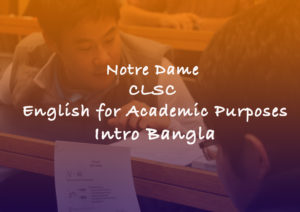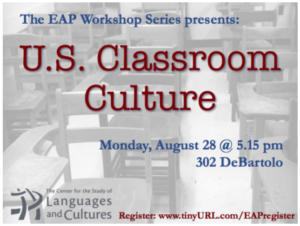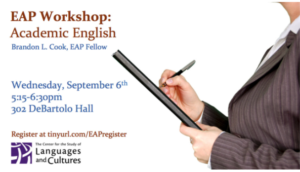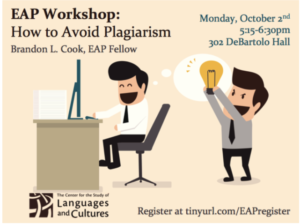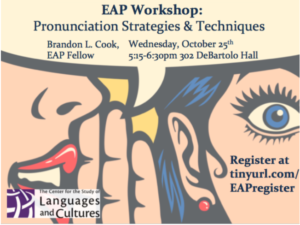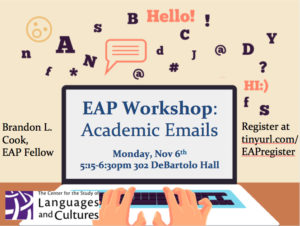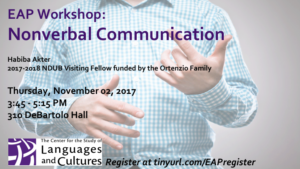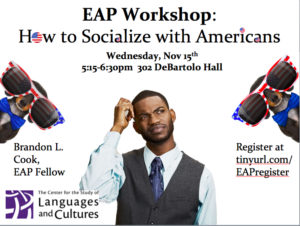The CSLC English for Academic Purposes (EAP) Program offers English support and enhancement for international students. The goal of the program is to empower international students to maximize their academic success through coursework, tutoring and self-study resources. The EAP program offers weekly workshops on a range of topics, including advanced English grammar, reading and listening strategies, and pronunciation techniques. Lisa Joy Oglesbee is in charge of the EAP program. Please find videos of these workshops below with an introductory video form Habiba Akter.
Habiba Akter EAP Introductory Video
EAP Workshop: U.S. Classroom Culture
Presenter: Brandon Cook
In this workshop, we will discuss the cultural values that influence U.S. classrooms and how they are manifest in classroom behavior and expectations. We then explore how international students and instructors can effectively guide classroom discussions and connect with students, as well as how they can participate in academic discussions themselves. Please click on the image below to watch this workshop video.
EAP Workshop: Academic English
Presenter: Brandon Cook
Based on Gerald Graff and Cathy Birkenstein’s “They Say/I Say”: The Moves that Matter in Academia (2006), this workshop presented several techniques non-native speakers can use to maximize their success when speaking and writing in English. It focused on strategies to use in academic writing, including how to use secondary sources, and how to situate one’s own work within broader academic discourse. Please click on the image below to watch this workshop video.
EAP Workshop: How to Avoid Plagiarism–Paraphrasing and Using Sources Effectively
Presenter: Brandon Cook
This workshop focused on ways to present academic sources in an ethical and transparent manner. Topics included a definition of plagiarism, a description of the harm it causes, and three strategies to use sources appropriately. The workshop concluded with a discussion of citation forms and how to learn more about them. Please click on the image below to download this workshop PowerPoint.
EAP Workshop: English Pronunciation: Strategies & Techniques
Presenter: Brandon Cook
To improve your pronunciation, there is a lot more to think about than just isolated vowel and consonant sounds! This workshop, led by Brandon Cook, addressed the other aspects of pronunciation that are important for fostering clear communication, and it identified strategies for practicing these skills. Please click on the image below to watch this workshop video.
EAP Workshop: Grants and Fellowships
Presenter: Brandon Cook
This workshop will explore the nuts and bolts of searching for grants and fellowships through search engines like Pivot, as well as finding successful examples of applicants from ND to specific grants, like the Fulbright, NASA, DAAD, and many more. It also deals with the nuts and bolts of composing application documents like CVs and research abstracts and asking faculty for letters of recommendation. Please click on the image below to watch this workshop video.
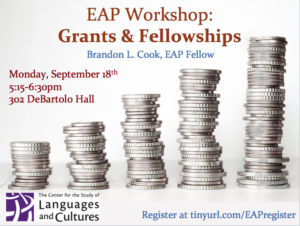
Academic Emails
Presenter: Brandon Cook
In this workshop, participants discuss the cultural and grammatical issues at play in professional email communication. We will practice writing emails to different audiences. Please click on the image below to watch this workshop video. The volume on this video is low. Please increase your volume in case you don’t hear anything.
Non-verbal Communication
Presenter: Habiba Akter
Communication is not all about words. A fair amount of nonverbal cues play a vital role in conveying a message effectively. Nonverbal Communication (NVC) is a way of communicating through sending and receiving wordless signals. The meaning of a gesture may vary in different cultural contexts. Hence, a non-native speaker of a language may find it difficult to get accustomed to the patterns and layers of NVC of the target language. In this age of cross-cultural interaction, there must be standard ways of coding and decoding nonverbal cues. This workshop focuses on those in the international context.
“They Ask ‘How Are You?’ But Then Walk Away”: How to Socialize with Americans
Presenter: Brandon Cook
Each nation and culture has a unique set of norms, expectations, and natural rhythms when it comes to socializing and making connections with other people. The United States is no different. In this workshop participants will recognize and address some of the particularities of interpersonal relations and patterns of socialization that international students often find most challenging about American culture. Participants will come away with a better understanding of how to relate to their American colleagues and Americans in general.
